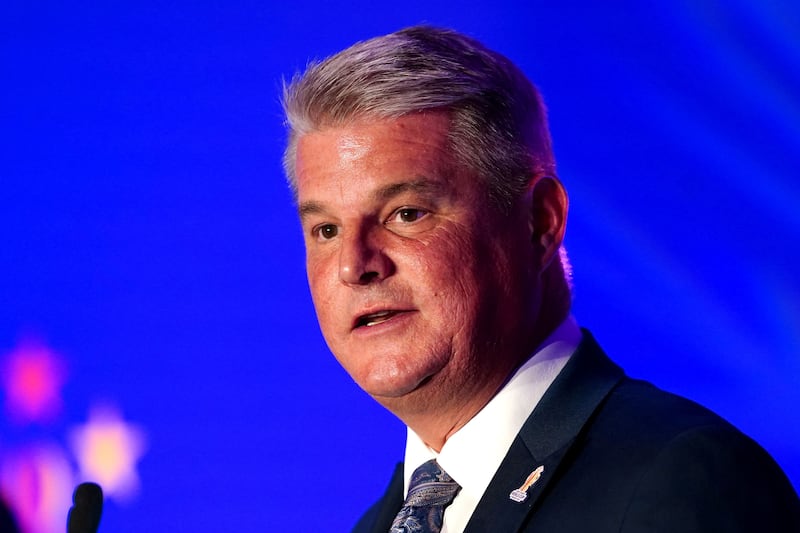THE Alliance deputy leader has said a lack of action to ban conversion therapy in Northern Ireland has forced him to propose a Private Members’ Bill.
Eóin Tennyson issued a public consultation on a Bill that would make engaging in conversion practices a criminal offence.
Critics have pointed to failed attempts to introduce a ban in Scotland earlier this year, with the matter ultimately deferred to Westminster.
A commitment to introduce a conversion ban in England and Wales were also included in the King’s Speech in September.
Mr Tennyson called conversion practices “deeply damaging and destructive acts which have no place in our society,” with a message that those with LGBTQIA+ identities are wrong and need to be “fixed” or “cured.”
“The impact can be lifelong. Those with lived experience of conversion practices have reported severe mental health consequences, including anxiety, depression, and suicidal thoughts,” the Upper Bann MLA said.
He said he was launching the consultation “in the absence of action” from the Minister for Communities, the DUP’s Gordon Lyons.
So-called conversion practices have no place in any modern society.
— Alliance Party (@allianceparty) December 5, 2024
Today, @EoinTennyson has launched a consultation on proposals to ban these cruel and archaic practices.
Make your voice heard.👇 https://t.co/GJNnlfhB0C pic.twitter.com/ZVEZLnE0Rh
In April 2021, the Northern Ireland Assembly passed a non-binding motion calling for a ban.
Sinn Féin’s Deirdre Hargey, who was Communities Minister at the time, had supported the motion and said her officials had commenced policy work on the issue.
The Department has been contacted for a response on the current status of the work.
In the Alliance consultation, conversion practices are defined as “techniques intended to change or suppress someone’s sexual orientation or gender identity”.
The Bill would create a criminal offence of engaging in conversion practices with the intent of suppressing or changing the gender identity or sexual orientation of the individual.
It would also apply to those who enabled the service or allowed coercive behaviour to take place.
Those accused would be able to present a defence that their conduct was reasonable in the circumstances.
The Bill would not allow for a defence of consent, as people may agree to take part due to “external pressure or imbalanced power dynamics.”
This would carry a maximum prison sentence of seven years.
Helping a person leave Northern Ireland for conversion therapy would also be punishable by a maximum jail term of three years.
The Christian Institute’s NI Policy Officer, James Kennedy, said Mr Tennyson’s proposals were largely copied from proposals by the Scottish government – which he said was abandoned over fear of legal challenges.
“Thankfully, abusive practices are already outlawed in Northern Ireland,” he said.
“Christians oppose verbal and physical abuse. And yet we would be at risk from the Alliance proposals if we seek to offer pastoral care and prayer that accords with the Bible’s teaching.”
He said there was a risk conversion therapy would criminalise “innocent activity” like parenting and the “ordinary work of churches” including prayer and pastoral care.

In October, the former DUP leader Arlene Foster said that a row over conversion therapy within her party had been the “straw that broke the camel’s back” over her removal.
It followed a week after she abstained from the Assembly vote calling for a ban.
“I was aware that one of our members had a daughter who was gay - in an attempt to try and diffuse the situation, I said: ‘Well, we’ll just abstain,‘” she said.
“It was a non-binding vote. But by saying just abstain, people got very angry about that and that was the trigger then for my removal, which came just a week later.”
The extent to which conversion therapy still takes place remains uncertain, as there is still no standard legal definition and many will be reluctant to share their experiences.
According to a UK-wide LGBT survey in 2018 – commissioned by the Government Equalities Office – around 5% of 108,000 who responded said they had been offered conversion therapy, with 2% going through it.
It also found that those from an ethnic minority background and those with a religious faith were more likely to be affected.
If you have an opinion on the issues raised in this article and would like to submit a Letter to the Editor to be considered for publication, please click here
Letters to the Editor are invited on any subject. They should be authenticated with a full name, address and a daytime telephone number. Pen names are not allowed.









